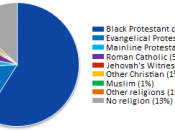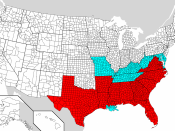The turn of the century could be described as a higher point in Afro-American history, but in no way the lesser of two evils. After Lincoln's 1862 Emancipation Proclamation (and more so the 13th Amendment to the Constitution,) slavery was abolished. But moving on to the 20th century, segregation and racism still ran rapid in America. After seeing the end of the tunnel, African-Americans again they were pushed down into second-class status. Entering into one of the most progressive centuries in history, it appeared that democracy was for whites only. Actually, the increasing growth of racism, and of segregation as well, led inevitably to the development of opposition groups bent on destroying this discrimination. But there was still a long way to go.
Considering the former, the twentieth century did indeed start off slow, and was filled with hits-and-misses. In 1901, the last African-American congressman, George H. White, gave up his seat on March 4th.
No African-American would serve in Congress for the next 28 years. In 1910, segregated neighborhoods were first enforced. On December 19 of that year, the City Council of Baltimore approved the first city ordinance designating the boundaries of black and white neighborhoods. This ordinance was followed by similar ones in Dallas, Texas, Greensboro, North Carolina, Louisville, Kentucky, Norfolk, Virginia, Oklahoma City, Oklahoma, Richmond, Virginia, Roanoke, Virginia, and St. Louis, Missouri. Case in point: Hit - The Supreme Court later declared the Louisville ordinance to be unconstitutional in 1917. Miss - 1 down, 7 to go. To top that off, federal segregation was being established. On April 11, 1913, the Wilson administration began government-wide segregation of work places, rest rooms and restaurants. This was nothing but poking the bear for a new generation.
Even though slavery was abolished, the epicentre of the problem remained down...


